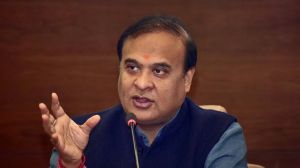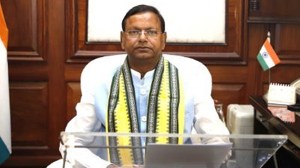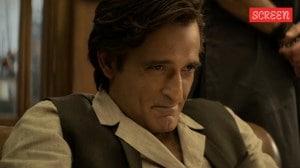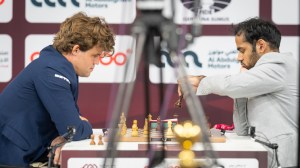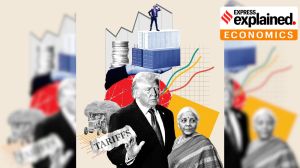Separatists Without Guns
In the back room of an exclusive social club across the street from the US Embassy, Flemish separatists are plotting the breakup of Belgium.

In the back room of an exclusive social club across the street from the US Embassy, Flemish separatists are plotting the breakup of Belgium. In their tailored suits and silk ties, they appear unlikely rebels. Their 67-year-old leader, Remi Vermeiren, is the retired president of one of Belgium8217;s biggest banks. Today, along with nearly half of his Flemish compatriots, he advocates slicing the country in half, creating two independent nations: Dutch-speaking Flanders in the north and French-speaking Wallonia in the south.
8220;We are an expensive, inefficient country,8221; Vermeiren said, settling into a moss green leather chair. 8220;For a while, 8216;separatist8217; was a dirty word. Now there are almost daily discussions about it.8221;
As the 27-member European Union strives to become a unified political and economic counterweight to the US, the bloc8217;s own seat of government 8212; the Kingdom of Belgium 8212; is in the midst of a crisis that is pushing the country ever closer to a breakup.
The campaign here is a modern-day separatist movement for a globalised world. This is not a war of guns and guerrillas. It is a conflict debated in the news media, parliaments, cafes, bars and establishment clubs of a country confronting the schisms now facing nearly every European nation: the struggle over national identity.
Belgium has been without a national government for more than three months now. King Albert II has staged a rare royal intervention to bring about negotiations between the Flemings, who live in the economically prosperous north, and the Walloons, of the financially floundering south. But the two regions, which have separate governments, can8217;t agree on how to govern together.
Most Walloons vehemently oppose independence because their economy relies heavily on government subsidies.
Last week, a former Flemish journalist attempting to raise international awareness of his dysfunctional country8217;s plight, listed 8220;Belgium, a kingdom in three parts,8221; for sale on the auction website eBay. He noted, however, that the purchase included 8220;300 billion euros in national debt.8221; EBay officials pulled the listing after receiving a bid of 13 million.
8220;We are two democracies with different parties and totally different needs,8221; said Geert Bourgeois, the urbane cabinet minister in charge of foreign affairs, media and tourism for the Flemish government. 8220;We speak different languages. We don8217;t watch the same television. We don8217;t read what is written in the south, and the Walloons don8217;t read ours.8221;
Some Belgians warn that talk of secession coming from the EU8217;s power centre sends a dangerous message to the rest of the world. 8220;If at the heart of Europe, with 10 million inhabitants, we are not able to have common views, how can we manage other countries,8221; said Joille Milquet, president of the French-speaking Humanist Democratic Centre party and one of the most influential opponents of greater autonomy or independence for Flanders.
So is 177-year-old Belgium really in danger of being erased from the map of Europe?
8220;What we considered unthinkable and fictional has now become thinkable,8221; said Beatrice Delvaux, editor of the Walloon newspaper Le Soir. 8220;The Walloons are like a wife who8217;s scared that her husband may leave her.8221;
In a recent poll for the newspaper La Libre Belgique, about 40 per cent of all Flemings and Walloons said they believe Belgium will not exist in another decade.
When the French-language RTBF television network aired a spoof news bulletin last year announcing that Flanders had declared independence, Belgium had been dissolved and the king had fled, thousands of panic-stricken Walloons flooded the station with calls. Yves Thiran, the head of news programming, said at the time, 8220;Our intention was to show Belgian viewers the intensity of the issue.8221;
Flemish separatist parties have made significant gains in local, regional and national parliamentary elections in recent years. The most radical of them 8212; the Vlaams Belang, or Flemish Interest, party 8212; now holds 25 per cent of the seats in the Flemish parliament.
8220;What has happened in the last few months is an enormous trigger,8221; Frank Vanhecke, one of the right-wing, pro-independence party8217;s top leaders, said of the lack of a national government. 8220;Independence has become a reasonable and realistic possibility. This revolution can8217;t be stopped.8221;
Vanhecke8217;s party has been ostracised by other Flemish parties, who consider it too radical as well as racist and anti-Islamic, and Vanhecke was arrested at an anti-Islam rally in Brussels last week. But even moderate Flemish politicians are embracing the issue of Flemish independence, or autonomy to the point of near-independence.
After general elections on June 10, the king turned to Yves Leterme 8212; leader of the Flemish Christian Democrats, who won the highest number of Dutch electoral college votes in the national Senate races 8212; in hopes of finding a unifying political voice for the government. But Leterme proved anything but a unifying figure. He created a political uproar when he told the French newspaper Liberation that Belgium was 8220;an accident of history8221;. And he criticised the king for not speaking Dutch well enough.
The Flemings and the Walloons have never gotten along well. Each side has its own autonomous parliament, political parties, schools, newspapers, television stations, celebrities, Boy Scouts and pigeon-racing clubs.
8220;Now there8217;s a new generation on each side, and they don8217;t know each other,8221; said Pierre Vercauteren, a political scientist at Catholic University.
The French-speakers of Wallonia dominated both politics and the economy in Belgium for decades. The south8217;s coal reserves and steel industries fuelled national prosperity while the Flemish region in the north remained largely agricultural.
In recent years, the regions8217; fortunes have been reversed. The Flemish are in the majority with about 58 per cent of the population, and their economy has exploded with high-tech companies and international trade, while the south is languishing with obsolete factories and high unemployment.
Vermeiren, like many Flemings, said he is tired of having his taxes and his region8217;s revenue going to support economically backward Wallonia. The Walloons, he said, siphon off far more than their fair share of national funds.
The Flemings are demanding more autonomy over their budget and governance. The Walloons, anxious about being on the losing end, refuse to give in.
And what if Belgium does cease to exist as a country?
Vanhecke, the Flemish Interest party leader, shrugged and said he doesn8217;t believe the world will miss it.
8220;Who cares?8221; he said.
- 01
- 02
- 03
- 04
- 05








